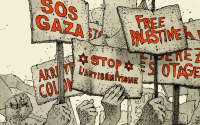Making the peace will be even harder than winning the war The Guardian, Friday October 26, 2001Asked to list the requirements for a successful United Nations operation in Afghanistan, a veteran of of the world body's efforts in East Timor and Bosnia raised a warning forefinger. "Number one - don't do it," he said. It was of course meant rhetorically. Everybody who works for the United Nations, from Kofi Annan down, knows they have no choice about taking on the mission to reconstruct Afghanistan being inexorably pushed in their direction by the United States and Britain.
But it was an expression of the perplexity and anxiety among UN officials and experts about a problem which, as another said, lies somewhere on the scale "between incredibly difficult and totally impossible". Cambodia, Bosnia, Kosovo or East Timor seem almost simple by comparison.
President Bush has declared that the UN must have a role in Afghanistan, while the US Congress facilitated the payment of outstanding American dues. However, this Republican conversion has less to do with a change of mind about either the UN or the previously scorned task of "nation building" than it has with America's interests. The US does not want to be the obvious patron of any new government in Afghanistan. That would be counterproductive, both inside the country and in the Muslim world at large. So it wants somebody else to craft an accommodation between the country's rivalrous neighbours and somebody else to help bring a transitional government into being. That "somebody else" is, naturally, the UN. While delegating these taxing functions, Washington seems committed to preserving Pakistan's primacy in Afghanistan and at the same time itself wants to exert a significant influence, at least on security issues.
The British government has been even more enthusiastic about the United Nations, with Jack Straw saying, in his speech this week at the International Institute for Strategic Studies, that because "only the UN has the global reach, the instruments and the expertise", it must take the lead in Afghanistan. Some of the greatest opportunities for the United Nations have arisen when the powers have pushed it into action for their own self-interested reasons, but so have some of its worst failures.
The potential for good of an extended period of intimate cooperation between the United Nations, the United States and other powers over Afghanistan is clear. But the potential for bad is also clear, ranging from being blamed for all the degrees of failure that are possible in Afghanistan to that of being perceived, rightly or wrongly, as an American tool.
What the United Nations has to give in situations like this is a legitimacy that no one else can bestow. The currency in which it deals is impartiality, but that currency can be devalued if the UN is seen to bend too much to the will of one power or one small group of powers. There may thus be some among United Nations workers who wish that the United States had not stumped up the last portion of its dues, since the debt was a useful reminder that there is real tension between the two.
In this vital business of using, without depleting, the UN's capital of legitimacy and impartiality, the question of what form the UN role should take is fundamental. The maximalist approach would be to treat Afghanistan on Cambodian lines. There, UN peacekeeping troops entered in force, and, under a supreme national council led by Prince Norodom Sihanouk, the United Nations ran five ministries including defence and foreign affairs, while preparing for elections and organising the return of refugees, the collection of weapons from armed groups, the establishment of human rights programmes, and the clearing of landmines.
Malcolm Harper, director of the British United Nations Association, suggests in a recent short paper that Cambodia is a better precedent than East Timor, partly because of the royal element in both situations. But many who have examined the problem believe that neither Cambodia nor East Timor is remotely appropriate, particularly since the UN mission in both places was based on military occupation.
They find something unconvincing about the picture of a UN high authority in Afghanistan appointing and dismissing provincial governors, standing down militias, or banning "unacceptable" political activities, even if it had a tough security force on call. It is far from established, in any case, that a respectable peacekeeping force could be raised at all, let alone that it could be big enough to have a pervasive presence across the country. Jack Straw's inquiries in Ankara on whether the Turks would take a lead in peacekeeping, for instance, met with an ambiguous response.
If a force were raised, and if it included contingents from neighbouring countries, it could well be prone to dangerous partisan pressures. This touches on the central Afghan problem, which is that internal divisions, ethnic and religious, are so intensely keyed to the interests of neighbours and other outside powers. Everywhere that the UN has operated, foreign interests have been important but, with the exception of Congo, it can never have faced a more forbidding tangle than Afghanistan. As the Afghan journalist, Mohammed Qabool, says in a dispatch to the Institute for War and Peace Reporting: "The only common point among all the interpretations of a broad-based government in the future is the intention of the outsiders to impose their own favoured personalities and groups."
If the "UN as boss" mode is felt to be unrealistic, the more tentative approach which appears to be favoured by people in the United Nations both in New York and in the field, including Kofi Annan, also has its dangers. Under this, the UN would expect the bigger powers to persuade the neighbours and other near powers - Pakistan, Iran, India, Saudi Arabia, and the central Asian states - to follow a hands-off policy while a decentralised government was built up in Afghanistan. The UN would help, with technical, humanitarian and educational programmes, but it would not be directly in the business of governing.
But in avoiding taking on much authority and having only limited military support, the UN might find itself in a position where it could not effectively confront armed groups, pursue programmes of democratisation, women's rights or media reform, or assist in war crimes proceedings. Analysts like Qabool are insistent that unless the United Nations finds a way of empowering what remains of Afghanistan's educated classes, the new arrangements could amount to nothing more than a coalition of warlords liable to break down at any moment.
These are the dilemmas that have been thrust on the men and women at the United Nations, who have in the past usually managed to salvage some sort of peace out of the world's political and military messes. This time the choices before them are truly crucial, both for the future of Afghanistan and for the future of the UN itself.






